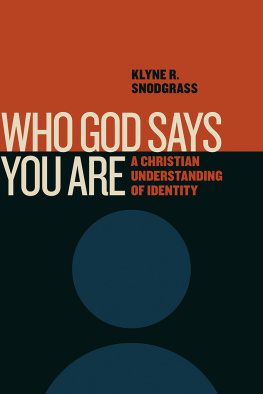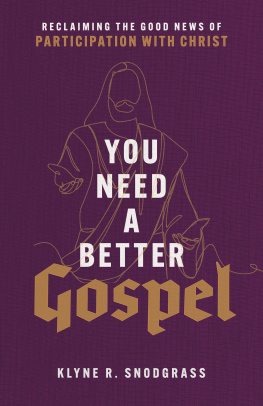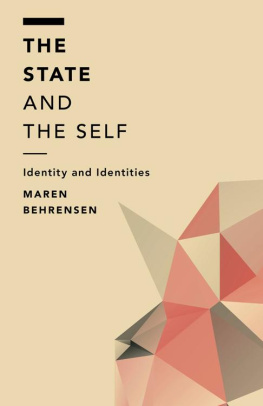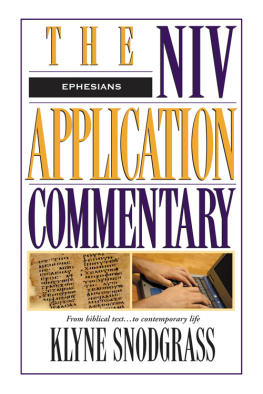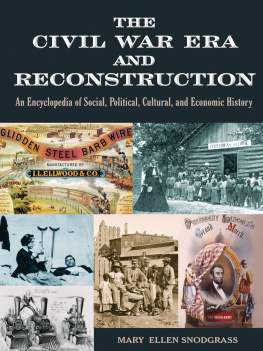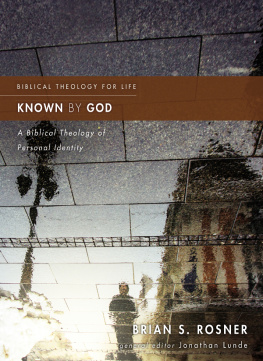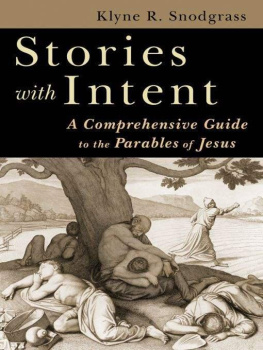Who God Says You Are
A Christian Understanding of Identity
Klyne R. Snodgrass
WILLIAM B. EERDMANS PUBLISHING COMPANY
GRAND RAPIDS, MICHIGAN
Wm. B. Eerdmans Publishing Co.
2140 Oak Industrial Drive NE, Grand Rapids, Michigan 49505
www.eerdmans.com
2018 Klyne R. Snodgrass
All rights reserved
Published 2018
27 26 25 24 23 22 21 20 19 181 2 3 4 5 6 7 8 9 10
ISBN 978-0-8028-7518-1
eISBN 978-1-4674-4964-9
Library of Congress Cataloging-in-Publication Data
Names: Snodgrass, Klyne, author.
Title: Who God says you are : a Christian understanding of identity / Klyne R. Snodgrass.
Description: Grand Rapids, Michigan : William B. Eerdmans Publishing Company, [2018] | Includes bibliographical references and index.
Identifiers: LCCN 2017031274 | ISBN 9780802875181 (pbk. : alk. paper)
Subjects: LCSH: Identity (Psychology)Religious aspectsChristianity.
Classification: LCC BV4509.5 .S66 2018 | DDC 233dc23
LC record available at https://lccn.loc.gov/2017031274
To Ethan, Ryland, Caeden, and Gabriel and to their parents: may they be wise enough to become who God says they areand especially to Phyllis, about whom Ryland may well have been right
And in memory of my brother Duane and my valued friend LeRoy Cox
Contents
This book is about the most fascinating subject in the world: you. What makes youand mewho we are? I have been captivated for years by the subject of identity, a topic that has become a major focus in religious, philosophical, and sociological fields, and rightly so, for identity is foundational for all of life. This book is intended for anyone willing to wrestle with identity, especially Christians. In focusing on identity, this book offers a chance for each of us to consider who we really are, what makes us that way, and who we should become. Nothing is more important than dealing with our own identity. I write as a New Testament scholar, not as a psychologist, psychiatrist, or philosopher, and I am not consciously Freudian or part of any other school of thought. I have drawn deeply, though, from several fields treating identity. I deal with identity because I must and because I am convinced that is what the Bible is really about. It seeks to tell us who God says we are.
Quotations from Greek and Latin classical writers are from the Loeb Classical Library, unless otherwise stated. The translations of the Scripture passages are my own, and part of the material in the chapters treating factors 1, 2, and 4 is adapted from lectures I gave at Dallas Theological Seminary that were later published as three articles: Introduction to a Hermeneutics of Identity, Jesus and a Hermeneutics of Identity, and Pauls Focus on IdentityBibliotheca Sacra 168 (JanuaryMarch 2011): 319, (AprilJune 2011): 13345, and (JulySeptember 2011): 25973, respectively. I thank the editors of Bibliotheca Sacra for permission to draw on this material.
Gratitude must also be expressed to several people who read part or all of the manuscript and provided reflection. They represent several arenas: social workers and sociologists, horse trainers, church leaders, pastors, theologians, editors, and seminary students. They include my daughter Valerie Luberecki, my brother Phil, Everett Anthony, Cathy Norman Peterson, Brian Tucker, Joel Johnson, Jenna Brand Frost, Peter Schwich, Stephen Spencer, Michael Emerson, and, most helpful of all, my wife Phyllis. No shortcoming of this book should be attributed to them, but such people have helped frame my own identity and in the process have made life extremely enjoyable. I am indebted to them.
I also want to express my appreciation to the good people at Eerdmans for showing interest in my work and for helping to bring it to publication, especially James Ernest, Michael Thomson, and Jenny Hoffman.
In the social jungle of human existence, there is no feeling of being alive without a sense of identity.
Erik Erikson, Identity, Youth, and Crisis
Identity and meaning in life go hand in glove. To have meaning is to have identity.
Robert Brawley, From Reflex to Reflection?
There is only one question: Who are you? Everything else in life flows from that one question. That is true whether you are a person of faith or not; the identity question is the question. In fact, every religion, every denial of religion, and every philosophy or ideology seeks to tell people who they are, how they fit with the reality around them, and how they should then live. If your life has any meaning, it will be because you projectand have projecteda meaningful identity.
Who are you? Who gets to say? My answer is God, but that raises the question, Who speaks for God? My answer is Scripture, but that raises the question, Who gets to interpret Scripture? In the end, each person is responsible for interpreting, but that does not suggest some kind of naive individualism or that you can make a text mean what you want or that readers do not need to be taught. Interpretation should take place within a community of faith, one that includes the whole church past and present. We read together to understand together and hold each other accountable.
The purpose of any scripture is to answer the identity question, to tell people who God says they are. A text is only called scripture because someone believes that text has power to define and transform life. This is certainly the case with the Bible. The Bible seeks to tell us who we are, who God says we areand should behow we fit in Gods purposes, and how we should live because of our identity.
At some level I have always known Scripture was about identity. Long ago I discovered a statement. I have lost the source, but the statement is lodged in my mind. It says, People were always coming to Jesus and asking, What must I do? and he in effect responded, Tell me who you are, and then you will know what you must do. Since discovering this statement, I have had an interest in identity, an interest that grew slowly at first but then became a compelling fascination. In more recent years I have begun to understand that all my work as a New Testament scholar and teacher seeks to explain identity.
The Bible is about identity. It explains Gods identity or Christs identity, but such explanations never have the purpose of giving us abstract knowledge about God. The identity of God or Christ is explained to show what humans created in Gods image are to be. John Calvin put it this way: Without knowledge of self there is no knowledge of God. Without knowledge of God there is no knowledge of self. You cannot know yourself without knowing the One in whose image you were created.
I am well aware that the word identity does not appear in most translations of the Bible and that there is no obvious corresponding Hebrew or Greek word. The English word identity appears late in the game, toward the end of the sixteenth century. Ancient people did speak of being and of self but had no word corresponding to our word identity. While the word may be recent, the thinking and theology are not. At some level, if you are human, you have to focus on identity, even though many try to avoid it. Life is about identity construction.
The famous maxim of Greek wisdom inscribed in Apollos temple at Delphi, and often repeated, urged Know yourself. The Greek philosopher Epictetus commented, First learn who you are, and then, in light of that knowledge, adorn yourself. You are a human being.
Can we and should we know ourselves? Goethe said, I do not know myself, and God forbid that I should. Know yourself? If I knew myself, Id run away. We know things but not ourselves, and if we knew ourselves, we might not be pleased with what we saw.

